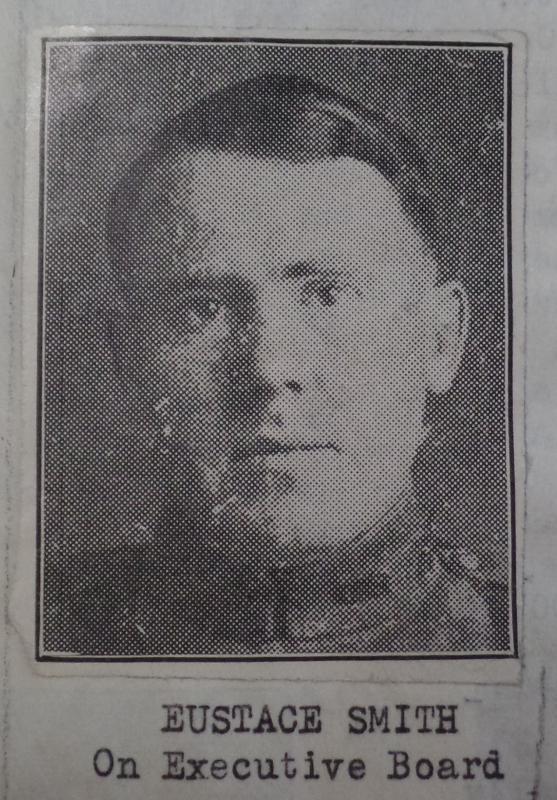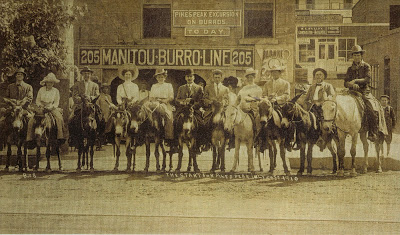“Many friends of Eustace Smith will be pleased to learn that he is among the few Kansans admitted to the officers’ training camp which has just been established. When he failed to get into the first camp, he enlisted in a Hutchinson company, where his abilities were promptly recognized and he was made first sergeant. This made it easy for him to get into the officers’ training camp, and his previous military training will be of great help to him in his new field.”
As an implant to a small town, I often find myself listening to conversations where because everyone knows all about the person being discussed, details are assumed and left unsaid. This small item in the January 10, 1918 issue of the Kinsley Graphic had that effect on me, and I decided to find out more about Eustace.
I discovered that Eustace was the son of F. Dumont and Florence E Smith, who had come to Kinsley from Illinois in the fall of 1886. This was the year Frederick had earned his law degree from the National Law School in Washington, D.C. (part of George Washington University today). He practiced law in Kinsley for 22 years, was elected mayor in 1893 and served as a Kansas State Senator, 1900-1908.
Eustace was born to this prominent couple on March 26, 1889. He was a bright and adventurous child. He is mentioned in the newspapers as being at the head of his class, performing in musicales, and delivering orations.
According to the August 14, 1903, Kinsley Graphic, Eustace and Paul Higgins, in between their junior and senior year of high school,“…started for Colorado Wednesday evening. They will return as soon as their money runs out.” In the following week’s paper, Eustace reported on their experience of riding burros to the summit of Pike’s Peak to see the sunrise. The overnight trip cost $3 for burro, slicker, and blankets and a quarter for lunch. There were 24 in the party including seven ladies in “divided skirts”. Starting out at 3 p.m. in fine weather, it soon turned to rain and then snow. They camped halfway up and being cold and wet, spent the night singing around a campfire instead of sleeping. They continued their journey about 3 a.m.
“After a while it began to snow and our clothes which were wet froze and we also about froze. I thought we were never going to reach the Peak. It was terrible!!! When we did reach it, I was so cold that when I got off my donkey, I had to walk in the same position that I had ridden as my legs were frozen into that position.”
They warmed up in a shelter at the top, watched the sunrise on the snow covered peak, and then rode back down in delightful weather.
Eustace was one of three in the Kinsley High School, Class of 1904. He delivered the Salutatory Oration on “Our Navy” while his father, Senator Smith, gave the commencement address.
He graduated college from Lawrenceville School in Lawrenceville, N. J., and in 1908 he attended his father’s alma mater, the National University in Washington D.C. where he was unanimously elected president of his class. He graduated and was admitted to the Kansas bar in 1911 and returned to his father’s law firm which had relocated to Hutchinson, Kansas.
All through his college years and his early career, Eustace was part of the social scene. When I read of the dinners and house parties, I found myself being envious of an age when people entertained, and the TV and digital devices did not occupy all their time. The fancy fetes surrounding his engagement to Anna Keturah Steele and their subsequent marriage on October 29, 1913 were attended and celebrated by all the prominent people of Kinsley and Hutchinson.
In 1914, the young attorney made an unsuccessful run for Reno County Attorney on the Republican ticket. In 1916, he was actively helping to enlist Cavalry troops to be ready for immediate service in the event that war is declared against Mexico.
At the outbreak of the WWI Eustace was one of the first Hutchinson volunteers, joining a machine gun company, part of the 137th All-Kansas infantry. At Camp Doniphan he was commissioned a second lieutenant and assigned to the 140th infantry with which he went overseas. This bright, talented young man was willing to serve, and the army made a wise decision training Lieutenant Smith as an officer as we will see as the war news progresses.


